Ad hoc police ethics panel urges police disciplinary authority
rest with Police Chief
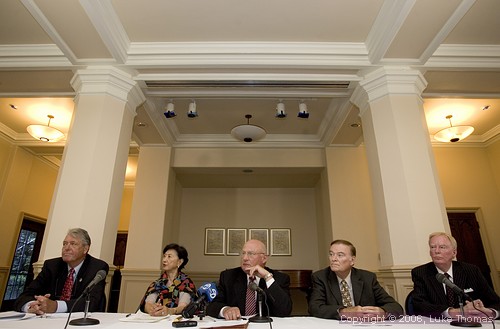
Police Ethics panel members George Grotz, Lillian Sing, Tony Ribera,
Frank Jordon and John Dineen announce the panel's findings at
Lone Mountain College yesterday.
Photo(s) by
Luke Thomas
By Pat Murphy
July 19, 2006
The San Francisco Police Commission should "hear only the
most egregious cases" of alleged police misconduct, the co-chair
of a panel convened on police ethics recommended Tuesday.
The suggestion came as one of several recommendations for improving
the current disciplinary process it deemed "largely ineffective."
Former San Francisco Police Chief Tony Ribera, made the remarks
prior to issuing recommendations delivered six weeks after two
days of hearings by the ad hoc Police Ethics Panel.
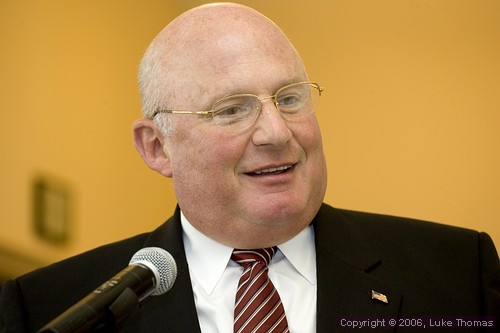
Tony Ribera
Ribera, who heads the Criminal Justice Institute of the University
of San Francisco, organized the panel with co-chair Frank Jordan,
a former San Francisco mayor and police Chief.
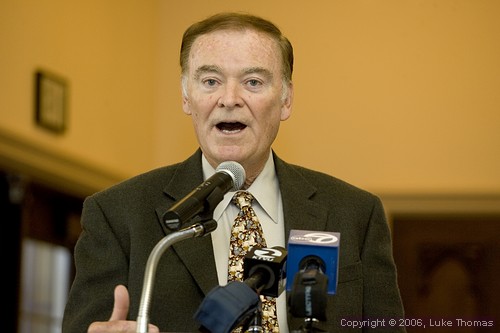
Frank Jordon
The panel concluded that overlapping discipline authority by
the police chief, the Office of Citizens Complaints (OCC), and
the Police Commission has become ambiguous.
"The disciplinary process is largely ineffective,"
Ribera reported.
"Both authority and responsibility are ambiguous. The commission,
the department and the OCC appear to be vying for authority.
"The mayor, the Board of Supervisors and the public should
demand that these three parties immediately establish a mutually
supportive working relationship."
Police chief authority to suspend officers should be extended
from ten to 90 days lessening need for the OCC to bring moderately
serious cases before the police commission, the panel urged.
The commission, which Ribera pointed out has governing authority
over both the police department and the OCC, already holds power
to access all reports on which a police chief determines discipline
metes out in lesser or moderate cases of police misconduct.
It called for reaffirming police chief as primary discipline
authority.
And urged Mayor Newsom to take a larger role in clarifying police
chief authority and leading the OCC, police commission, and police
department to a more workable relationship.
Mayor Newsom was not immediately available for comment.
Recommendations include:
1. The mayor and the commission should clearly affirm that the
chief is the "chief administrative officer" of the department
and give her the commensurate support.
2. With the Creation of an Early intervention System unit (EIS),
and internal audit component should be included to ensure compliance
with the department's values and directives.
3. A "Code of Honor," based on accepted law enforcement
standards should be adopted and sworn to by all members of the
department. Part of the code should stress that dishonest will
result in termination by the commission.
4. The chief and her command staff should make a concerted effort
to visit the various police units, particularly the district stations,
on a regular basis.
5. The commission's staff should be expanded to include one full-time
staff analyst to assist with research and policy issues.
6. The magnitude of change facing the department over the next
few years is significant. A comprehensive strategic plan, which
incorporates an expanded Automated information System, should
be developed and implemented.
Disciplinary recommendations include:
1. The mayor of San Francisco should demand that the commission,
the department, the OCC, and the Police Officers Association (POA)
immediately establish a mutually respectful working relationship
(while there may be limits on the mayor's actual legal authority
to make this happen , he can certainly garner public support for
this position).
2. The City's budget should include adequate funding for a comprehensive
Early Warning system, as well as other technological needs.
3. The commission should order the chief, the director of OCC,
and their staffs to have face-to-face dialogue on a regular basis.
A cordial and professional relationship is critical.
4. All members of the department must recognize that the OCC
was created by a mandate of the voters and its investigators should
always be treated with professional respect.
5. The police commission is being burdened with too many disciplinary
cases. The commission should only take the most serious cases
to their level. To address the immediate backlog, the commission
should utilize independent hearing officers for appropriate cases.
6. The authority of the chief of police to suspend officers for
ten days should be extended to 90 days (A charter amendment may
be necessary).
7. Clear protocols for investigating complaints of misconduct
against officers should be adopted and published by both the department
and OCC, and approved by the commission. The goals of such protocols
should be to ensure integrity, transparency and to enable all
disciplinary cases to be adjudicated within one year.
8. The "Disciplinary Penalty and Referral Guidelines (1994)"
should be updated and the EIS incorporated into them.
9. The OCC's mediation program shows potential for adjudicating
less serious cases in a more informal fashion. The program should
be expanded, as should other strategies for disposing of minor
complaints more expeditiously.
10. The OCC should consider summary investigations for certain
types of minor cases, which could be referred to the department
for informal displace or remedial training.
Panelists included Morgan Gorrano who focuses on police issues
arising before the San Francisco Civil Service Commission, former
State Judge Lillian Sing, San Francisco State University Journalism
Professor Yumi Wilson, John Dineen who serves as senior consultant
to the California Commission on Peace Officer Standards and Training,
former local FBI spokesman George Grotz, and former Northern California
District US Attorney Joseph Russoniello.
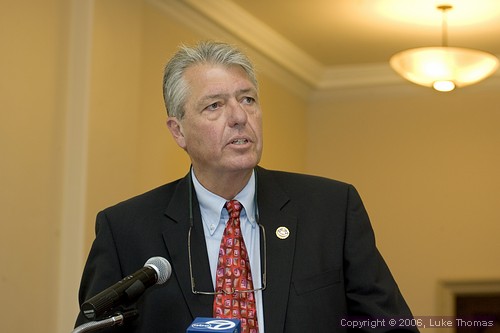
George Grotz
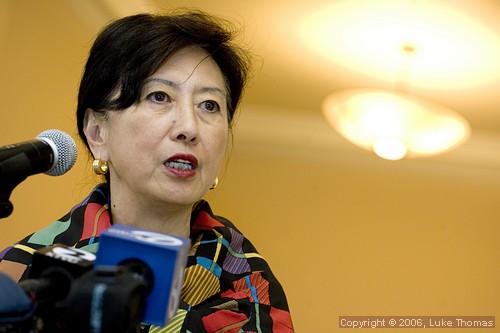
Lillian Sing
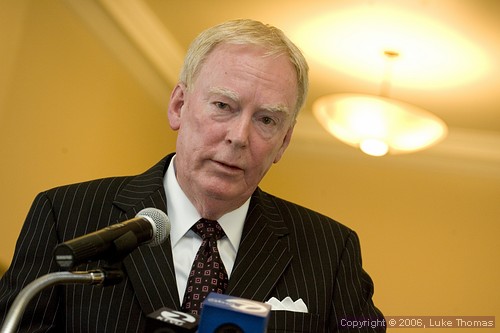
John Dineen
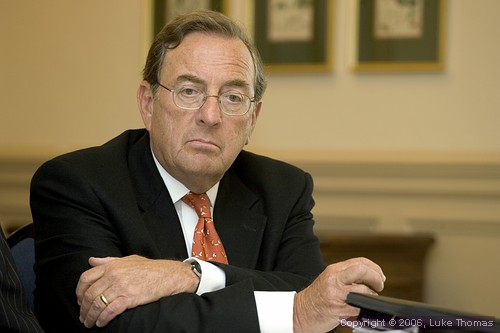
Joseph Russoniello
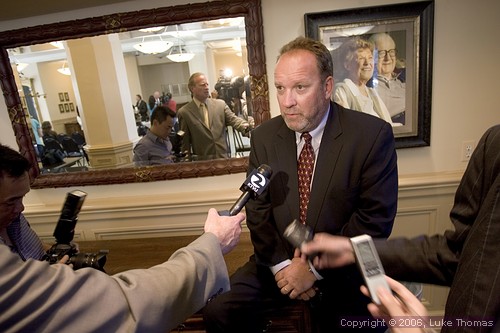
POA President Gary Delagnes takes questions from reporters.
Reached at home, Wilson said she supports panel recommendations
and did not attend yesterday's meeting due to illness of her son.

####
|